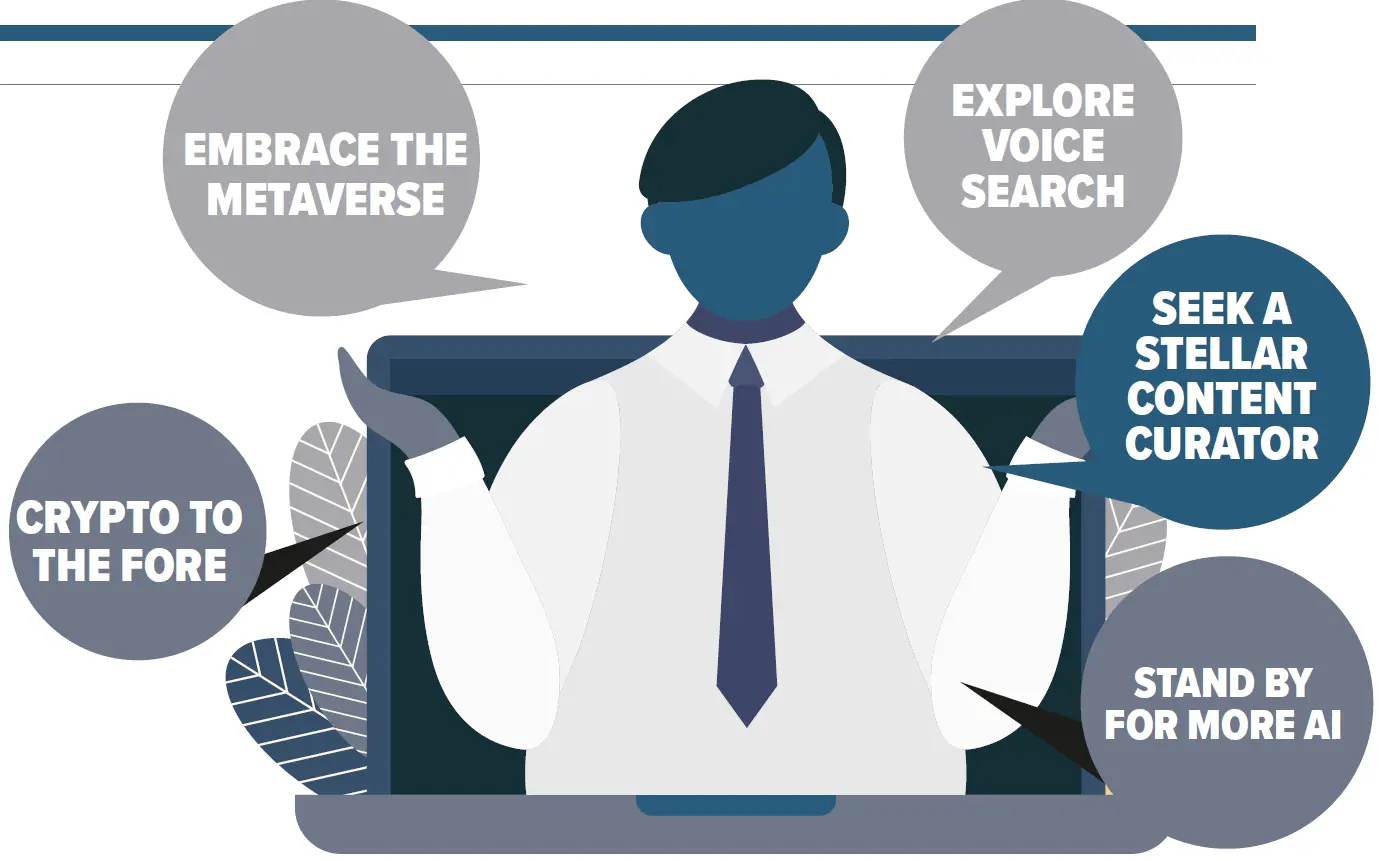

Lee-Ann Johnstone identifies her five essential digital and marketing trends that affiliate programmes should stay aware and on top of in order to stay relevant as 2022 unfolds
As 2022 kicks off, what better time to review your affiliate marketing strategies and get ready for the year ahead? There is no doubt that the digital landscape is continuing to evolve at a rapid pace, and it’s our job as digital and affiliate marketers to ensure we keep our finger on the pulse of latest trends, technologies and emerging opportunities within our industry. Here I will discuss some of the trends I think are critical to look at and consider for your programme growth and development in 2022.

The power behind long-tail SEO, visual and voice search
It’s estimated roughly 50% of search is now voice activated. Many affiliates are working to this end in their content creation strategies already. However, some affiliate managers are none the wiser in terms of how this could affect their partner referrals and traffic sources. It’s imperative that programme managers collaborate closely with their affiliates to seek and find niche audiences using phraseology that doesn’t depend on keyword-specific search terms. We also need to consider content strategies that support the growth of voice search activations across multichannels. To rank effectively on search engines, you now need to answer the questions that are being asked. While tools such as Google Suggest can be used for the more generic questions, affiliates and operators can work together to create content that is meaningful and relevant to the user to drive traffic on to the brand. Invest in the content that’s on the website. If you have a portal that’s already packed with valuable content, excellent; build on it and add in relevant FAQs. Are the operators you are promoting hosting a slot game that you are performing well for in search results? Add an FAQ or something specific around that slot to that page and link to the operator. Do they offer a specific type of bet or bonus for which you have created a guide? Update that page with question-specific answers and link that back out to the operator.
In terms of the visual element, content needs to be easily digestible – and infographics or videos are a great way to break content up. It can increase dwell time on your pages and allows you to add SEO data to other elements of your site. It’s a worthwhile exercise to do an SEO audit of your site, find the content gaps and opportunities and create a content plan to build on those. Compare it with your competitors and add in voice and visual search attributes for your affiliates to help you to outperform competitors.
Invest in finding content curators, not traffic drivers
As the traffic acquisition channel becomes more fragmented, affiliate programmes will no longer be able to oversee and manage a one-size-fits-all approach. Before, there was a huge focus on SEO and PPC affiliates as a key source of traffic in programmes, and while that is still a valuable and viable source which is heavily relied on, we need to understand that affiliates can come in a variety of shapes and sizes. Don’t discount someone because they haven’t got traffic. Ask questions as you might miss an opportunity to work with a stellar content creator who is adept at bringing you quality customers this way.
Think of affiliates as entrepreneurs, not as traffic drivers. Consider their business needs, not just their requirements for traffic and volume and think about how you can help them to grow. Affiliate managers need to continue to self-educate on how best to work with all types of traffic referrers to avoid missing out on new niche opportunities. It could be that you need to create specific models dedicated to influencers or brand ambassadors and consider platforms and channels you hadn’t previously as part of your programme makeup. When working with these new kinds of content curators, affiliate managers need to learn to understand their needs and create collaborative partnerships. This will become a vital support to the growth of your own programme and expansion efforts.
Find the right marketing and AI tools
There is no doubt artificial intelligence (AI)is here to stay. According to a report on DataProt, 37% of businesses employ AI technology as a whole, and there is no doubt that this is one of the key things digital marketers should be looking at to augment programme growth, customer conversion and retention. There are a number of great marketing technologies being used in affiliate programme management to automate elements like partner discovery, outreach and monitoring. This year I think we’ll see a lot of SaaS products upgrade their infrastructures to implement automation and help affiliate managers get more efficient in terms of affiliate administration.

Just recently I’ve seen one such company launch an innovative payment and tax service that monitors affiliate earnings and plugs into their financial accounting software to simplify payment processing from multiple partners and keep their business spending on track. And that’s before considering research, a massive part of affiliate managers’ roles being to continually source new forms of traffic and niches to explore for new business. We need to remember that increasing numbers of people work from home, so businesses will be investing more in tools that make their workforce and processes more effective and adapt to include these technologies as part of the relationship management workflows. Affiliates need to familiarise themselves with these types of technologies, so they are educated in the level of personalisation they provide and work with operators on these types of campaigns. Connection is going to be key; too often deals are missed as contacts are not easily found. It will be difficult to create campaigns with partners with little knowledge as to how they work. AI technology is already being used more efficiently than human analysis to optimise campaigns in real time and I think we’ll see affiliate platforms start to integrate this tech in a more direct way to help campaigns perform at better profit margins.
Micro transactions, transparent data
Crypto and blockchain will start to innovate and break data silos. With Facebook and Apple changing their policies on third-party data we’ll see more affiliates build their databases and own their customers rather than simply driving traffic from one place to another for remuneration. Data is a key component for affiliates to increase the value of their business, and those that are building to scale or sell later on want both control over the data and to learn how to optimise their campaigns and increase their revenues from them. Some affiliates are already implementing key marketing technologies to improve their own customer experiences prior to sending them on to operators for conversion. The take up of crypto within businesses of opportunities in the blockchain sphere present transparency and efficiencies when it comes to commercial contracts. Tracking is also going to be coming to the fore as more development projects emerge in this space and are readily adopted by the wider community. According to Coindesk, the crypto industry is showing a 12% increase in volume this year compared to 2020. These aren’t stats that affiliates or affiliate managers can ignore, and although affiliate managers may be used to dealing in more traditional igaming niches, again this is something they will need to self-educate on. I think we’ll see the need for better data. Rationalising the number of customer data silos will necessarily drive this part of the Web3.0 movement forward and affiliate programmes, networks and tracking solutions will need to keep up.

The metaverse: how will you engage with it?
Augmented reality, 3-D virtual environments – the metaverse is happening. Right now. We’re all going to be engaging in it at some point in the future. How will we be transferring our brands, our messages, our business interactions into real time and transformative interactions for social and business engagement? How will extended reality feature in your affiliate programme? How will you engage your partners when you can’t physically see them and keep them affiliated to your brand? No doubt there is going to be a lot of learning in this space in the coming years, but I think it’s key to start understanding the opportunity it can afford you. Start looking at how to leverage it for your business as an early adopter. 2022 will be a big year for the industry. We will see continued growth in affiliate marketing as we have consistently since the early 2000s. Brands will invest more, relationships will become more important and we have lived through a pandemic that has changed the way the world interacted and spent online. The main message I have is never underestimate the power of great connections. Make sure you are always learning and keeping up to date with the latest digital marketing trends and emerging markets and niches within our industry to keep yourself operating one step ahead! With almost two decades of digital marketing and affiliate experience within the retail, payments and the fast-paced esports and gaming industry, Lee-Ann Johnstone is an award-winning digital marketing strategist and affiliate performance marketer. In 2018 she launched the performance and affiliate marketing agency AffiliateINSIDER, and recently she developed AMPP, a new initiative designed to help affiliate programme managers grow their programmes and drive consistent sales. She’s recently been inaugurated as a member of the prestigious forbes.com Agency Council and is a regular contributor to leading performance and digital marketing platforms such as TheDrum.com, forbes.com, iGB Affiliate and GPWA.
Want to learn more affiliate marketing hacks to get you the best CPA/rev-share deals possible? Then you NEED to join us for Affiliate Meet Markt in Berlin on 26-27 Oct. And the best part… Affiliates attend for FREE.
